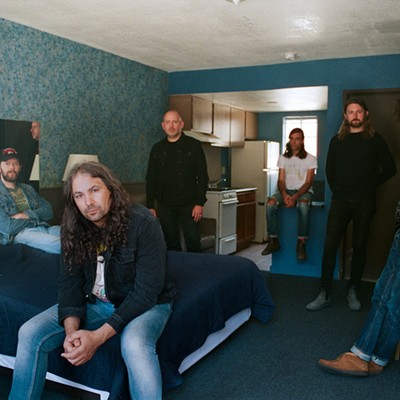Fifteen years and five albums later, Coheed and Cambria came full circle in early April by arriving before the band's very existence.
It sounds confusing, because it is. The New York quartet's latest, "Year of the Black Rainbow," is a prequel to its conceptual epic — an interplanetary tale of murder, cosmic energy and mythical purpose that's both shared through song and illustrated in ink.
To push the story forward, front man Claudio Sanchez went back in time — a logical move in the Coheed continuum. As its driving force, Sanchez is singer, songwriter and storyteller. The group formed in the mid-1990s and went through a handful of early iterations, names and lineups. Its first studio release, "The Second Stage Turbine Blade," came in 2002, shortly after the members had renamed the act after Coheed Kilgannon and Cambria Kilgannon, a married pair of protagonists central to "The Amory Wars," a science-fiction story written by Sanchez.
"Turbine Blade" was technical and rife with furious guitar riffing, off-kilter drum syncopations and Sanchez's signature falsetto sneer. The disc was unabashed prog-rock — a modern marriage between Geddy Lee and Fugazi, and formally codified Sanchez' vision and Coheed and Cambria's canon.
Each of the band's subsequent albums were written around "The Amory Wars" narrative. In 2004, Sanchez gave the story line new dimension by releasing the first in a series of eponymous comic books illustrating the ongoing saga of Coheed and his wife, Cambria.
The album/illustration pairs continued with the band's follow-up, 2003's "In Keeping Secrets of Silent Earth: 3," and a graphic novel was published to mirror the act's third studio release, 2005's "Good Apollo, I'm Burning Star IV, Volume One: From Fear Through the Eyes of Madness." The second "Good Apollo" volume, 2007's "No World for Tomorrow," has no illustrative counterpart — not yet, anyway. But to accompany Coheed's most recent release, Sanchez took things a step further.
"Year of the Black Rainbow" is both an album and a full-fledged novel, which Sanchez co-wrote with Peter David, a New York Times-bestselling author and comic writer who's worked for DC Comics and Marvel Comics, penning tales for a host of iconic characters that range from Spider-Man and The Incredible Hulk to Powerpuff Girls and Batman.
Sanchez said he was committed to a "prose" component to accompany the new record, arranging an informal meeting with David early last year.
"A lot of the questions he brought up concerning the concept kind of opened my mind to looking at the piece a little differently," Sanchez said.
"The Amory Wars" is magnified and fantasized to be sure, but Sanchez said the "meat and potatoes" of the ongoing epic is a direct extension of his own life and experiences. In bringing David aboard, Sanchez said he was able workshop ideas and explore the story in a way not possible on previous projects.
"I only see it from the one side. I just look at it this one way," he said. "Getting another personality in that formula who can kind of sit back and look at things a bit more objectively, I think, is very important."
Pink Floyd's "The Division Bell" tour was an early inspiration for Sanchez, who attended a show as a high school freshman. But as personally invested as he is in the concept behind Coheed and Cambria, when it comes to the music " and especially his fellow bandmates — he doesn't need everyone or every element to echo his vision.
Musically, Coheed's songs are formed organically. In rehearsal and the recording studio, Sanchez said his role is largely that of a lyricist and that songs and albums form of their own "free-form and open" accord.
"It's not a complete necessity to understand the conceptual work to hit home with the music," he said.
Likewise with fans, Sanchez said. Coheed and Cambria needs only be as layered as a listener is willing, he said, noting that the group's music and live show is the best way to get "the closest version of the true story."
"It isn't a complete necessity to understand to enjoy the music or to participate in making the music," he said. "It's really just kind of an extension for those who want it." —Joe Wertz









